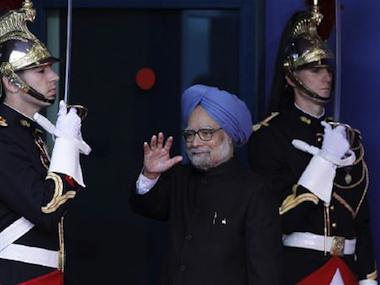Manmohan Singh, who will be 80 next year, earned his reformist stripes as finance minister back in 1991 when he prised open India’s state-stifled economy, opening the way for a long run of dazzling growth.
However, as prime minister since 2004, he has presided over less spectacular reforms such as opening the country’s nuclear power market and freeing petrol and fertiliser pricing. And his government, beleaguered by corruption scandals, has slipped into a policy paralysis since it won a second term two years ago, taking the gloss off the “India Shining” story.
[caption id=“attachment_141250” align=“alignleft” width=“380” caption=“retail FDI: Politics or Business? Reuters”]  [/caption]
Asia’s third-largest economy is nowhere near the crisis it was facing 20 years ago. However, growth has sagged since it topped 9 percent for three years in a row before the global financial crisis, and a monetary tightening cycle to stamp out inflation that began in March 2010 is exacerbating the slowdown.
The move to allow multinationals into India’s vast retail market will eventually help unclog some of the supply bottlenecks that stoke inflation.
It will also generate sorely needed foreign capital, not least for infrastructure investment, which the government’s latest five-year plan targets at an ambitious $1 trillion.
The government has taken other steps recently to attract funds from abroad. It has raised the limit on foreign investment in government and corporate bonds, and the cabinet has approved a law that - once it has parliamentary approval - will allow limited foreign direct investment in pensions firms.
While none of this will address the country’s economic ills in the short term, it may bring an immediate political gain.
Welcoming in the world’s big supermarket brands was risky. It will fuel fury with Congress among the millions of neighbourhood store owners, who could make the party pay in next year’s state elections.
But the promise of world-class shopping will be welcomed by India’s growing ranks of urban middle classes, and Singh’s uncharacteristic boldness could shore up public faith in his government as it gears up for a general election in 2014.
If there is a new phase of reforms underway, it is likely to be tentative rather than sweeping.
Some reforms, such as removing subsidies on diesel, are politically untouchable because of the backlash the party would face from the poor. Even the decision to open up the retail sector was hedged with provisos that will protect shopkeepers in small towns and rural areas.
The government’s plans to pass a food security bill, which would widen subsidies for the poor, are an example of how there has been little change in the populist stance of the Congress party. Critics say the bill will only add to the fiscal deficit.
Nevertheless, with its back to the wall, the government appears to have snapped out of its inertia.
“Reforms have been thrust upon it,” said Bhalla. “As long as the pressure is on this government it will continue to act.”
Reuters


)
)
)
)
)
)
)
)
)



